Susan Bernofsky's Blog, page 11
October 21, 2018
Saying Goodbye to Anthea Bell
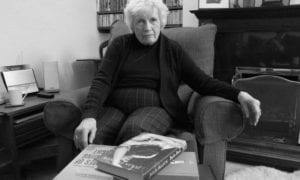
Anthea Bell as photographed by Gil Roth, who interviewed her in 2015.
I was enormously saddened to hear of the death of the great Anthea Bell, whom I’d admired from afar for many years but unfortunately never got the chance to meet. The revered translator of W.G. Sebald and the Asterix comics, but also Kafka (The Castle), Hans Christian Andersen, Stefan Zweig, Siegfried Lenz, Karen Duve, Hans Magnus Enzensberger, Saša Stanišić, Eugen Ruge, and many others, she was also the queen of children’s literature in translation, and her work repeatedly (seven times!) won her publishers the Mildred L. Batchelder Award, for books by René Goscinny, Bjarne Reuter, and Christine Nöstlinger. Her translations were also recognized with the Independent Foreign Fiction Prize, the Schlegel-Tieck Prize (4 times!), the Oxford-Weidenfeld Translation Prize, and the Marsh Award for Children’s Literature in Translation. In 2010 she was appointed Officer of the Order of the British Empire, and in 2015 awarded the Order of Merit of the Federal Republic of Germany.
Above all, she was known for her artistry and inventiveness that was nowhere more visible than in her playful Asterix translations that won the hearts of generations of young readers. 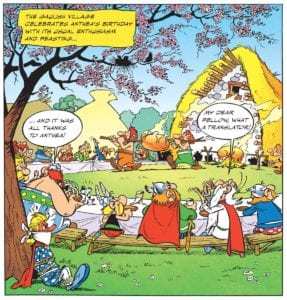 She hilariously named Obelix’s dog Idéfix (idée fixe) Dogmatix, for example. On the occasion of her death, her son Oliver Kamm tweeted an Asterix birthday greeting. Of course it makes sense that these adventurous Gauls loved her as much as she loved them. I wish I could have met her too before it was too late.
She hilariously named Obelix’s dog Idéfix (idée fixe) Dogmatix, for example. On the occasion of her death, her son Oliver Kamm tweeted an Asterix birthday greeting. Of course it makes sense that these adventurous Gauls loved her as much as she loved them. I wish I could have met her too before it was too late.
Since I didn’t know her and thus can’t write a personal tribute, I asked her friend and colleague Shelley Frisch – herself a respected and much-lauded translator – to write a few words of remembrance. This is what she wrote:
To know Anthea Bell is to love her. Those who never met her in person—as well as those who did—treasure her inspired translations, from A(sterix) to Z(weig). Her devoted followers include readers of all ages who have delighted in her clever word play (“PUNditry,” especially in Asterix) and her manifest joy in language’s myriad mutations. And they are grateful to have new dimensions of world literature brought to their (English-language) door in such splendid fashion.
I first met Anthea more than a decade ago during one of her trips to the US, when we were drawn together by a single word (Wandlerin) in a Cornelia Funke book she was translating from the German. The word intrigued us both. I can’t recall what rendering we eventually settled on, but “shape-shifter” was definitely a finalist. After much amusing rumination on this word, Anthea and I settled into a lively and regular transatlantic correspondence about, as they say in German, “Gott und die Welt” (everything under the sun, that is), and this correspondence continued on for several delightful years. Each cheered on the other’s awards and publications, and there was a good deal of shoptalk, especially, but by no means exclusively, about “our” Kafka. We bemoaned marketing departments’ notions of what makes a book attractive to buyers. (For Anthea’s translation of Julia Franck’s Die Mittagsfrau, the unpalatable solution of The Lunch Ladywas proposed, while she advocated for The NoondayWitch, or Lady Midday; the eventual compromise was The Blind Side of the Heart. I knew this feeling well; I’d recently had to agree to the subtitle “The Decisive Years” for one of the Kafka biography volumes, although Kafka was the least decisive person ever to walk the planet.)
Beyond these exchanges, though, was what I treasured most about our correspondence: nuggets of wisdom on a wide range of literary subjects combined with witty repartee about the “stuff” of daily life. We commiserated over back and hip pains, and giggled together about having to resort periodically to what we termed the “geriatric shuffle” (a normally ungiggly phenomenon; indeed, I’m doing that very dance these days), and concurred that going up a flight of stairs was far easier than going down, no matter what others might think. We groaned at her doctors’ insistence that “a stiff upper lip” was the best and only cure, and blasted her recent stay in the hospital for sending her home with a leg ulcer she had acquired there.
We delighted in the fact that we both had journalist sons. (Her younger son, Oliver Kamm, had left the world of investment banking “just as it was turning into a sphere of ill repute.”) Later on, in the sheerest of coincidences, Oliver praised Reiner Stach’s Kafka biography (in my translation) in the pages of the Times (London), upon which Anthea wrote me, to clarify, “I don’t think Oliver has the faintest idea that I know you!”
I could go on and on: there are delightful passages in her letters about the origins of her last name (nothing bell-like about it) and that of her ex-husband, Antony Kamm. (“Kamm, although a short and simple name, is difficult for the British to spell (you get Kahn, Cohen, Khan, Kamen, all sorts of permutations). I guess that Antony’s forebears lived on the crest of hills or mountains somewhere in Germany, and that is the sort of Kamm involved, nothing involving the use of a comb.”)
I’ll add one last Kafka comment here, though there’s so much more I could say. In 2010, Anthea wrote me this: “Only when I was translating The Castle did I see its affinity with Alice Through the Looking Glass. At times the landlady of the Bridge Inn, Gardena, could be a dead ringer for the Red Queen.” I continue to ponder this captivating comparison between two of my favorite books.
I sorely miss Anthea Bell already. She was a friend and colleague of rare wit and talent, and, most importantly, of generosity and kindness. We are lucky to have had her in our world, and fortunate that even in her absence, we can revel in the brilliant writing she left for current and future generations to enjoy.
Shelley Frisch
The post Saying Goodbye to Anthea Bell appeared first on TRANSLATIONiSTA.
Apply Now to be 2019 Translator-in-Residence at Princeton University
 Princeton University’s Institute for International and Regional Studies (PIIRS) started its last year, and now they’ve issued a call for applications for this, the second year of the program. There are some changes. In Spring 2019, the TIR will be asked to co-teach a seminar in translation studies as well as mentoring student translators and participating in other courses offered by PIIRS and the Program in Creative Writing. So it’s a proper visiting position with the rank of Lecturer, and – as last year – comes with a salary and an office. The TIR is expected to be an established literary translator with a project in progress. This year’s application deadline is Nov. 10, 2018.
Princeton University’s Institute for International and Regional Studies (PIIRS) started its last year, and now they’ve issued a call for applications for this, the second year of the program. There are some changes. In Spring 2019, the TIR will be asked to co-teach a seminar in translation studies as well as mentoring student translators and participating in other courses offered by PIIRS and the Program in Creative Writing. So it’s a proper visiting position with the rank of Lecturer, and – as last year – comes with a salary and an office. The TIR is expected to be an established literary translator with a project in progress. This year’s application deadline is Nov. 10, 2018.
Princeton is a lovely place to spend time for many different reasons that I wrote about last year. If you’re able to clear your schedule to spend the spring there, I’m sure you’ll very much enjoy the experience.
You’ll find more information on this position and application guidelines on the Princeton University website.
The post Apply Now to be 2019 Translator-in-Residence at Princeton University appeared first on TRANSLATIONiSTA.
October 10, 2018
2018 National Book Award for Translated Literature Shortlist Announced
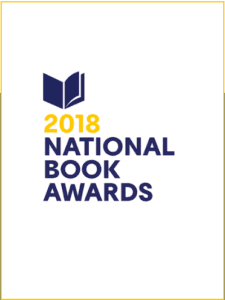 If you loved the first annual National Book Award for Translated Literature longlist that came out a month ago, I know you’ve been eagerly awaiting the shortlist, and here it is, announced just this morning!
If you loved the first annual National Book Award for Translated Literature longlist that came out a month ago, I know you’ve been eagerly awaiting the shortlist, and here it is, announced just this morning!
Négar Djavadi, Disoriental
Translated by Tina Kover
Europa Editions
Hanne Ørstavik, Love
Translated by Martin Aitken
Archipelago Books
Domenico Starnone, Trick
Translated by Jhumpa Lahiri
Europa Editions
Yoko Tawada, The Emissary
Translated by Margaret Mitsutani
New Directions Publishing
Olga Tokarczuk, Flights
Translated by Jennifer Croft
Riverhead Books / Penguin Random House
Big congratulations to all the shortlisted translators (and also authors, of course). The winners of the 2018 National Book Awards will be announced at a ceremony in New York on Nov. 14. More details on the shortlisted books are available on the National Book Foundation website. Best of luck to all the finalists!
The post 2018 National Book Award for Translated Literature Shortlist Announced appeared first on TRANSLATIONiSTA.
October 8, 2018
2018 Warwick Prize for Women in Translation Longlist Announced
 This is the second year of the Warwick Prize for Women in Translation – the first-ever prize to honor beautiful books in English translation by women authors. Last year I had the thrilling experience of having a book I translated selected for the prize. And now I’m excited to announce that the prize committee has just released the longlist for the 2018 prize, and it’s a lovely list indeed, which I say quite apart from the circumstance that I have a book on it – it’s full of authors and translators whose work I admire. Have a look:
This is the second year of the Warwick Prize for Women in Translation – the first-ever prize to honor beautiful books in English translation by women authors. Last year I had the thrilling experience of having a book I translated selected for the prize. And now I’m excited to announce that the prize committee has just released the longlist for the 2018 prize, and it’s a lovely list indeed, which I say quite apart from the circumstance that I have a book on it – it’s full of authors and translators whose work I admire. Have a look:
Bang by Dorrit Willumsen, translated from Danish by Marina Allemano (Norvik Press, 2017)
Belladonna by Daša Drndić, translated from Croatian by Celia Hawkesworth (Maclehose Press, 2017)
Flights by Olga Tokarczuk, translated from Polish by Jennifer Croft (Fitzcarraldo Editions, 2017)
Go Went Gone by Jenny Erpenbeck, translated from German by Susan Bernofsky (Portobello Books, 2017)
Hair Everywhere by Tea Tulić, translated from Croatian by Coral Petkovich (Istros Books, 2017)
Land of Smoke by Sara Gallardo, translated from Spanish by Jessica Sequeira (Pushkin Press, 2018)
Letti Park by Judith Hermann, translated from German by Margot Bettauer Dembo (The Clerkenwell Press, 2018)
Maybe Esther by Katja Petrowskaja, translated from German by Shelley Frisch (4thEstate, 2018)
1947 by Elisabeth Åsbrink, translated from Swedish by Fiona Graham (Scribe Publications, 2017)
Of Dogs and Walls by Yuko Tsushima, translated from Japanese by Geraldine Harcourt (Penguin, 2018)
River by Esther Kinsky, translated from German by Iain Galbraith (Fitzcarraldo Editions, 2018)
The Emperor of Portugalia by Selma Lagerlöf, translated from Swedish by Peter Graves (Norvik Press, 2017)
The House with the Stained-Glass Window by Żanna Słoniowska, translated from Polish by Antonia Lloyd-Jones (Maclehose Press, 2017)
The White Book by Han Kang, translated from Korean by Deborah Smith (Portobello Books, 2017)
Vernon Subutex One by Virginie Despentes, translated from French by Frank Wynne (Maclehose Press, 2017)
The shortlist will be announced in early November, and the prize itself will be awarded at a ceremony at the Warwick Arts Centre on Nov. 13. For more information, please visit the Warwick Prize for Women in Translation website. Congratulations to all the longlisted translators!
The post 2018 Warwick Prize for Women in Translation Longlist Announced appeared first on TRANSLATIONiSTA.
October 1, 2018
2018 ALTA Fellows Announced
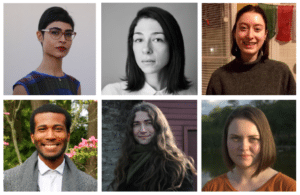 For an emerging translator, winning one of the prestigious ALTA Travel Fellowships from the American Literary Translators Association is an excellent way to enter onto the translation scene. At the yearly ALTA Conference, Fellows present their work at a reading that’s become one of the most beloved parts of the conference. Each year there are 5 or 6 fellowships awarded, including the Peter K. Jansen Memorial Travel Fellowship, which is reserved for a translator of color and/or a translator working from a diaspora or stateless language. This year’s conference is coming right up (in Bloomington, IN, Oct. 31 – Nov. 3), and I can’t wait to meet this new crop of fellows and hear their work. Here they are:
For an emerging translator, winning one of the prestigious ALTA Travel Fellowships from the American Literary Translators Association is an excellent way to enter onto the translation scene. At the yearly ALTA Conference, Fellows present their work at a reading that’s become one of the most beloved parts of the conference. Each year there are 5 or 6 fellowships awarded, including the Peter K. Jansen Memorial Travel Fellowship, which is reserved for a translator of color and/or a translator working from a diaspora or stateless language. This year’s conference is coming right up (in Bloomington, IN, Oct. 31 – Nov. 3), and I can’t wait to meet this new crop of fellows and hear their work. Here they are:
Elina Alter, 2018 ALTA Travel Fellow (Russian and German)
Lizzie Buehler, 2018 ALTA Travel Fellow (Korean)
Mariam Rahmani, 2018 Peter K. Jansen Memorial Travel
Fellow (Persian)
Aaron Robertson, 2018 ALTA Travel Fellow (Italian)
Brian Sneeden, 2018 ALTA Travel Fellow (Greek)
Maggie Zebracka, 2018 ALTA Travel Fellow (Polish)
You’ll find a full profile of each of these translators on the ALTA blog. Remember these names – you’ll probably be hearing more from them!
The post 2018 ALTA Fellows Announced appeared first on TRANSLATIONiSTA.
2018 Italian Prose in Translation Award Shortlist Announced
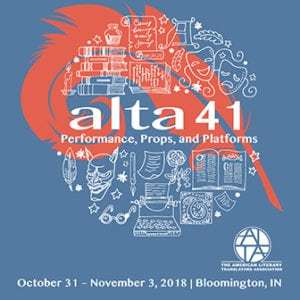 The Italian Prose in Translation Award is given out each year by the American Literary Translators Association at the yearly conference. The award comes with a purse of $5000. This year’s judges are Geoffrey Brock, Peter Constantine, and Sarah Stickney.
The Italian Prose in Translation Award is given out each year by the American Literary Translators Association at the yearly conference. The award comes with a purse of $5000. This year’s judges are Geoffrey Brock, Peter Constantine, and Sarah Stickney.
The 2018 Italian Prose in Translation Award Shortlist (in alphabetical order by title):
The Breaking of a Wave by Fabio Genovesi, translated by Will Schutt (Europa Editions)
Family Lexicon by Natalia Ginzburg, translated by Jenny McPhee (NYRB Classics)
For Isabel, A Mandala, by Antonio Tabucchi, translated by Elizabeth Harris (Archipelago Books)
These Possible Lives, by Fleur Jaeggy, translated by Minna Zallman Proctor (New Directions)
Ties, by Domenico Starnone, translated by Jhumpa Lahiri (Europa Editions)
The winner will be announced at the ALTA conference, which will be held this year from Oct. 31 to Nov. 3 in Bloomington, IN. Hope to see you there. And congratulations to all the shortlisted translators!
The post 2018 Italian Prose in Translation Award Shortlist Announced appeared first on TRANSLATIONiSTA.
September 30, 2018
Translation on Tap in NYC, Oct. 1 – 31, 2018
 Not sure I’m ready to let go of summer yet, but it’s officially fall now, which means October is a heartbeat away. Here’s what’s coming up in Translationland to accompany the changing leaves:
Not sure I’m ready to let go of summer yet, but it’s officially fall now, which means October is a heartbeat away. Here’s what’s coming up in Translationland to accompany the changing leaves:
Thursday, Oct. 4:
Launch event for Poso Wells by Gabriela Alemán, featuring translator Dick Cluster joined by Álvaro Enrigue. More information here. McNally Jackson Books, 52 Prince St. 7:00 p.m.
Friday, Oct. 5:
Us&Them: This installment of the series by translators who are also writers features Nick Glastonbury, Brian Sneeden, Will Schutt, and the team of Kira Josefsson and Jacqui Cornetta. More information here. Molasses Books, 770 Hart St., Brooklyn, 8:00 p.m.
Monday, Oct. 15:
Launch event for What’s Left of the Night by Ersi Sotiropoulos, featuring translator Karen Emmerich. More information here. McNally Jackson Books, 52 Prince St. 7:00 p.m.
Tuesday, Oct. 9:
Launch event for The Milk Bowl of Feathers: Essential Surrealist Writings, featuring translator Mary Ann Caws, who edited the collection, in conversation with Stephanie D’Alessandro. More information here. 192 Books, 192 Tenth Ave., 7:00 p.m.
Thursday, Oct. 11:
Launch event for Ideas Have No Smell: Three Belgian Surrealist Booklets (Ugly Duckling Presse), featuring translators M. Kasper and Mary Ann Caws, joined by McKenzie Wark. More information here. Printed Matter, 231 11th Ave., 6:00 p.m.
Tuesday, Oct. 16:
Kawsay – La llama de selva: translator Margaret Randall joins poet María Vázquez Valdez for a launch of their new book, joined by translators Elizabeth Zuba, Mónica de la Torre as well as Urayoán Noel and Lila Zemborain. More information here. McNally Jackson Williamsburg, 76 N. 4th St., Brooklyn, 7:00 p.m.
The post Translation on Tap in NYC, Oct. 1 – 31, 2018 appeared first on TRANSLATIONiSTA.
Happy International Translation Day 2018!

Saint Jerome in His Study (follower of Marinus van Reymerswael)
Translators have celebrated International Translation Day on September 30 for decades now, but as of last year, it’s an official international holiday, thanks to the United Nations, which adopted a resolution recognizing the holiday on May 24, 2017. The resolution, signed and presented by Azerbaijan, Bangladesh, Belarus, Costa Rica, Cuba, Ecuador, Paraguay, Qatar, Turkey, Turkmenistan and Viet Nam, proposed the UN recognize the “role of professional translation in connecting nations and fostering peace, understanding and development.” Obviously it’s not just literary translation that’s meant here, but we translators of books – like St. Jerome, legendary translator of the Bible, whose name day this is – certainly play an important role in international understanding by making the literature of different countries mutually legible. So raise a glass today to a translator whose work has brought you knowledge and pleasure. Cheers!
The post Happy International Translation Day 2018! appeared first on TRANSLATIONiSTA.
2018 Etxepare-Laboral Kutxa Translation Prize Announced
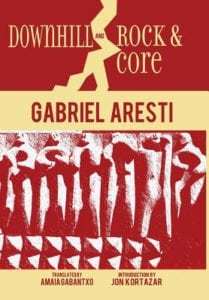 The Etxepare-Laboral Kutxa Translation Prize was launched in 2015 by Laboral Kutxa and the Etxepare Basque Institute as a way to honor and promote literary translations made directly from Basque (rather than via Spanish) into other languages. The €4,000 prize recognizes both the quality of the translation and the publisher’s promotional strategy and is split between translator and publisher. Along with this prize, the Etxepare Institute also launched a second initiative along with San Sebastian 2016: a project to teach more literary translators Basque by offering grants for them to study in the Basque Country for six-month stretches.
The Etxepare-Laboral Kutxa Translation Prize was launched in 2015 by Laboral Kutxa and the Etxepare Basque Institute as a way to honor and promote literary translations made directly from Basque (rather than via Spanish) into other languages. The €4,000 prize recognizes both the quality of the translation and the publisher’s promotional strategy and is split between translator and publisher. Along with this prize, the Etxepare Institute also launched a second initiative along with San Sebastian 2016: a project to teach more literary translators Basque by offering grants for them to study in the Basque Country for six-month stretches.
2018 marks the first time the Etxepare-Laboral Kutxa Translation Prize honors a translation into English. It has gone to translator Amaia Gabantxo for her translation of two poetry collections by Gabriel Aresti, often called the “father of modern Basque poetry,” which appeared in a single volume, Downhill and Rock & Core, published by the Center for Basque Studies at the University of Nevada, Reno. Congratulations, Amaia!
The post 2018 Etxepare-Laboral Kutxa Translation Prize Announced appeared first on TRANSLATIONiSTA.
September 12, 2018
2018 National Book Award for Translated Literature Longlist Announced
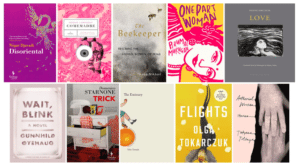 It’s been such a pleasure serving on the jury for the brand-new National Book Award for Translated Literature. It meant that I spent the summer reading lots and lots of beautiful translated books – lots and lots and lots of them – and I really enjoyed being professionally obliged to make time to do so much reading, something I hadn’t done in many years. It was incredibly difficult for the jury (which also included Harold Augenbraum, Sinan Antoon, Karen Maeda Allman, and Álvaro Enrigue) to pick just 10 of these books, but that was our job, and in the end we did it, and the National Book Foundation has just announced the list of semifinalists on the New Yorker’s Page-Turner blog. I’m just delighted with this longlist. Soon we’ll have to start talking about a shortlist, which will be even harder, but for now, please feast your eyes on this beautiful longlist of translated books:
It’s been such a pleasure serving on the jury for the brand-new National Book Award for Translated Literature. It meant that I spent the summer reading lots and lots of beautiful translated books – lots and lots and lots of them – and I really enjoyed being professionally obliged to make time to do so much reading, something I hadn’t done in many years. It was incredibly difficult for the jury (which also included Harold Augenbraum, Sinan Antoon, Karen Maeda Allman, and Álvaro Enrigue) to pick just 10 of these books, but that was our job, and in the end we did it, and the National Book Foundation has just announced the list of semifinalists on the New Yorker’s Page-Turner blog. I’m just delighted with this longlist. Soon we’ll have to start talking about a shortlist, which will be even harder, but for now, please feast your eyes on this beautiful longlist of translated books:
Négar Djavadi, Disoriental, translated by Tina Kover (Europa Editions)
Roque Larraquy, Comemadre, translated by Heather Cleary (Coffee House Press)
Dunya Mikhail, The Beekeeper: Rescuing the Stolen Women of Iraq, translated by Max Weiss and Dunya Mikhail (New Directions Publishing)
Perumal Murugan, One Part Woman, translated by Aniruddhan Vasudevan (Black Cat / Grove Atlantic)
Hanne Ørstavik, Love, translated by Martin Aitken (Archipelago Books)
Gunnhild Øyehaug, Wait, Blink: A Perfect Picture of Inner Life, translated by Kari Dickson (Farrar, Straus and Giroux / Macmillan Publishers)
Domenico Starnone, Trick, translated by Jhumpa Lahiri (Europa Editions)
Yoko Tawada, The Emissary, translated by Margaret Mitsutani (New Directions Publishing)
Olga Tokarczuk, Flights, translated by Jennifer Croft (Riverhead Books / Penguin Random House)
Tatyana Tolstaya, Aetherial Worlds, translated by Anya Migdal (Alfred A. Knopf / Penguin Random House)
The shortlist will be announced on October 10. Maybe you’ll have read all these delicious books by then? Congratulations to all the longlisted translators!
The post 2018 National Book Award for Translated Literature Longlist Announced appeared first on TRANSLATIONiSTA.
Susan Bernofsky's Blog
- Susan Bernofsky's profile
- 62 followers



